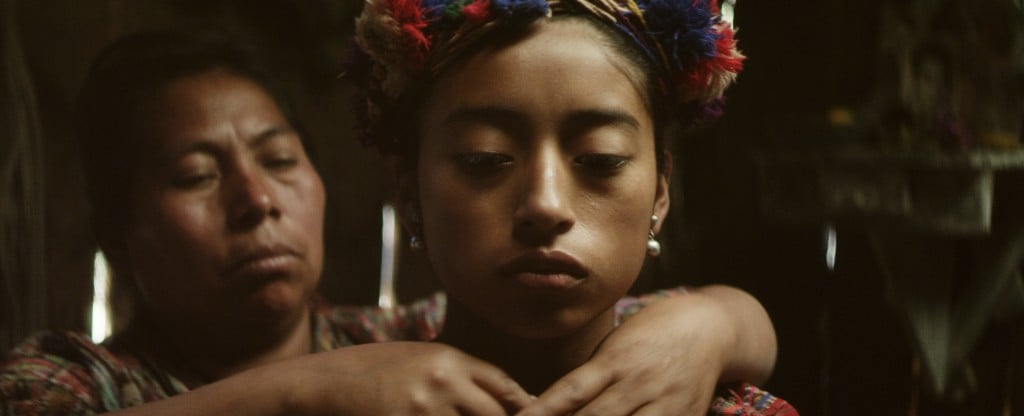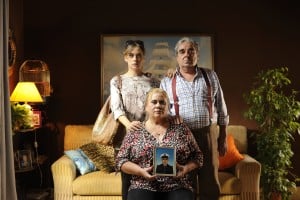¡Viva! Festival So Far: Film, Theatre and Art from Spain and Latin America
April 16, 2016

Photo Credit: Ixcanul (2015) – HOME Manchester
Cornerhouse’s Spanish and Latin American festival ¡Viva!, has moved to HOME to celebrate its 22nd edition. This year sees theatre included for the first time, building on the festival’s long-standing dedication to bringing the best film and art in the Spanish-speaking world to Manchester. Viewers have until 24th April to enjoy the festival programme. Our writers review some of the festival’s events so far.
Don Quijote: 5/5 stars
By Sophie Oates Black

Photo Credit: Don Quijote – HOME Manchester
Don Quijote as presented by Emma Frank and Kier Cooper is ambitious, tenacious and positively self-referential. Audience and actors are thrown together in a small studio space amidst a sea of pink and white cushions. The audience is encouraged to move around during the performance and at times interact. The performance successfully and innovatively establishes itself within the realm of ‘meta’, wherein actors consistently ask for ‘music’ or ‘lights’ and even admit to attempted audience deceit. The use of shadow puppetry is playful and works well as a tool for using certain chapters of the novel as a framework within which the performers promote a world of ‘Quixotes’ – people who change the world to be how they want it to be, who transform reality into a version of their utopian fantasy. The performance is simple yet beautiful and you leave feeling uplifted and educated. This lesson in adventures is not to be missed!
Ixcanul: 4/5 stars
By Amy Hills-Fletcher
A beautifully shot Guatemalan/French production, Ixcanul tells the story of Maria (María Mercedes Coroy), a poor 17-year-old indigenous girl living at the bottom of a volcano in rural Guatemala. The story tracks Maria’s sexual awakening as she falls in love with a local indigenous boy who picks coffee beans on the plantation where her father is a low-level manager. As Maria makes blunders reminiscent of any teenage girl finding her feet through puberty, the consequences are far more serious in the world of poor Kaqchikel peasants. Her parents have arranged for her to marry the boss of the plantation – a man far more powerful and educated than her family (he speaks Spanish and owns a truck). Ixcanul tackles various social issues: indigenous poverty, lack of education and the economic power yielded over the poor peasants by plantation bosses. The indigenous peasants mostly cannot speak Spanish and are at the mercy of those higher up in the pecking order for help and guidance. Additionally, indigenous women marry to become housewives and Maria’s family are too poor to avoid marrying her off to a man she doesn’t love – it is the only way their family can find economic security. All of the actors are debuting with this film and their performances are exceptional, with María Telón’s as Juana, Maria’s mother, being particularly affecting. Telón delivers a moving and powerful performance as a mother trying to make the best life for a daughter she deeply cares about, despite their indigeneity having dealt them the unfair hand of extreme poverty and marginalisation.
El Clan: 3/5 stars
By Amy Hills-Fletcher
El Clan details the true story of the Puccio Clan – a Soprano-esque family who kidnapped and murdered many people throughout the 80s in Buenos Aires. After the fall of the Argentine dictatorship in 1981, the disappearances that had plagued Argentina continued. However, the motive ceased to be political and became about money. James Scorer from the University of Manchester gave an interesting overview of the political context to the film prior to the screening, which, for me, was crucial to understanding the film, providing an angle that enhanced my viewing of a film that, although interesting historically, was not especially gripping. There is an obvious comparison to make with the The Sopranos, the major difference being, however, that unlike the characters in The Sopranos, I didn’t feel any emotional connection to the characters in El Clan. The narrative is framed around the family, the intention of the filmmakers I’m sure being to humanise the violent criminals on screen. The problem was that I didn’t feel any particular sympathy for any of the characters and therefore the film ended up being a series of kidnappings and murders where I didn’t particularly care what the outcome would be for the criminals involved. The action did not come fast enough, as the various family dramas that interlinked the criminal activity did not grip me. There is no denying Pablo Trapero’s talent as a filmmaker – I enjoyed all of the kidnapping set pieces and particularly appreciated the final act, when it becomes obvious that the family will not continue to get away with their criminal activity. The tension of this scene was excellent, and the acting exceptional, with Guillermo Francella brilliant as the ferocious patriarch Arquímedes Puccio. However, ultimately it was not quite enough to counter the slower elements of the film and the lack of empathy I felt towards the Puccio family.
Carmina y Amén: 4/5 stars
By Sara Barbera

Photo Credit: Carmina y Amén (2014) – HOME Manchester
A good laugh does not always come from flippant comedy, and Carmina y Amén is a clear demonstration of this. The apparently normal story of a death is reduced to absurdity when Carmina and her daughter María decide to conceal their husband and father’s death for the weekend in order to receive the man’s bonus paycheck on the Monday. With black humour, director Paco León portrays the everyday life of an average Andalusian woman, interpreted by formidable Carmina Barrios. Her acting stands out in this tragi-comic dimension and if at first we are inclined to judge her behaviour, by the end all the pieces of the puzzle are surprisingly brought together to cast her in a very different, almost sympathetic light. This great watch is not to be missed.
Further information about what’s left of the festival can be found here.

Comments